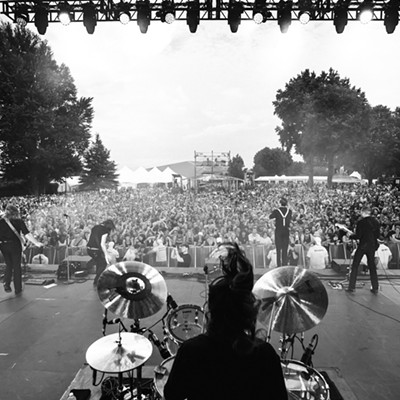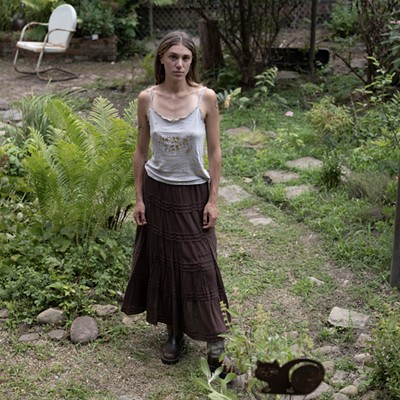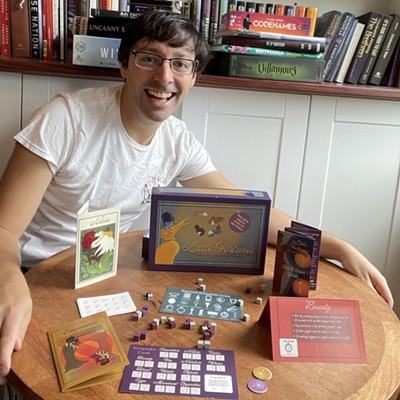On “Forgiveness,” Bean Kaloni Tupou — a.k.a. Try the Pie — sings, “I will be angry if I have to be / I will be angry if I want to be.”
The song itself is deceptively gentle. But in a world where anger is not often well received from anyone who isn’t a white male, the lyrics are bold. “As far as anger, it’s something I’ve been uncomfortable with my entire life,” Tupou explains. “Being angry and showing anger, knowing how to do that.” Friends constantly admonish the San Jose-based artist for being “too nice,” a criticism Tupou answers with: “I literally don’t know how to be any other way.”
But Tupou — who identifies on a shifting spectrum of gender fluidity and uses the neutral gender pronouns they/them/their — learned to access difficult feelings through music. In other words, “I can’t really be these things in real life, so I’m just going to make up my own language, and it will reflect the world that I’m trying to cope with.”
Tupou’s earliest musical experiences were in church. Their father moved from the Polynesian nation of Tonga to the United States with his family as a young man, and Tupou was raised going to a Tongan Methodist church which had been founded by the singer’s grandfather. “I specifically grew up going to functions and church events that were very heavily based on singing and harmonies,” Tupou says. “In Tongan churches one person will start singing, and everyone kind of builds on that. My grandpa would start singing, and my grandma would start singing over him in whatever octave she chose. Everyone would choose their own voice and that would make the harmony.”
This foundation of harmony is evident all over Domestication, Try the Pie’s first full-length release, and the first with a full band. Growing up in that kind of improvisational musical environment seemingly inspired a unique kind of rebellion: In high school choir, Tupou angered teachers by copying other students with similar range, rather than learning to read sheet music.
But Tupou was always more interested in rock music than church music — “[My dad] played Tongan spiritual music, but I wanted to be Nirvana.” Domestication — released in March by Detroit’s Salinas Records — won’t be mistaken for a Nirvana record. Though, lyrically there is a shared spirit of visceral honesty, this is aggression of a subtler sort. Try the Pie is more likely to invite comparisons to artists like La Luz, Waxahachee or the patron saint of ethereal fuzz, Mazzy Star.
From the title (and the family photo on the cover), it’s not surprising that Domestication centers around family. But, Tupou explains, it’s broader than that. “I have conversations like this every day with coworkers and friends, talking about where we come from as far as family and [home] environment. The thoughts and visions I had when I was writing the songs were informed by that, and by every intimate relationship that came after.”
Try the Pie has become a kind of umbrella for the entire timeline of Tupou’s solo musical efforts, though it took awhile for those efforts to find their place. “I remember this one girl saying that it was kind of Lilith fair music, which really hurt my feelings,” Tupou recalls with a laugh. “I was listening to stuff that I thought was punk.”
Eventually, Tupou befriended a queer, all-female band called Miss Flo, which led to playing an open-mic showcase at San Jose, Calif.’s Billy DeFrank Lesbian and Gay Community Center. “I was kind of blown away like, ‘Oh, that kind of music exists in San Jose?’ I think that’s when I realized I could start writing songs and perform as a project.”
Tupou became active in that scene as a member of bands like Sourpatch, Plume and Salt Flat. With Sourpatch, they helped found Think and Die Thinking, a DIY collective which puts together an annual festival focused on music made by women, people of color and members of the LGBTQ community. “We kind of worship ’90s pop from the Pacific Northwest, like K Records, Kill Rock Stars, riot grrrl bands. We wanted to emulate [late-1990s Olympia, Wash.-based fest] YoYo a GoGo,” Tupou explains. “[It was also] an alternative to the grind and hardcore scene in San Jose, which is full of people of color, but is really male-centric.”
The most recent fest was in July. And as Tupou embarks on their first truly solo tour — which began at Impose magazine’s #OFFBRAND fest in New York City, and stops in Pittsburgh on Friday — they’re still riding on the energy of that experience. “This year, the fourth year, we hit our stride. It’s like, every conversation [in that environment] is a meaningful conversation and everyone is in the same place.”
Which spurs a question asked by members of DIY scenes around the country: How do you successfully create a safe space for marginalized populations? “My main advice would be to always find ways to regenerate things, and breathe new life into things,” Tupou says. “Remember that — even if things feel shitty or in a lull — there are always multiple options, and there’s always a possibility to thrive. Remember how resilient you can be, and how resilient we can be as groups of people.”












